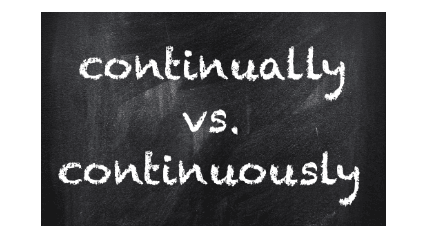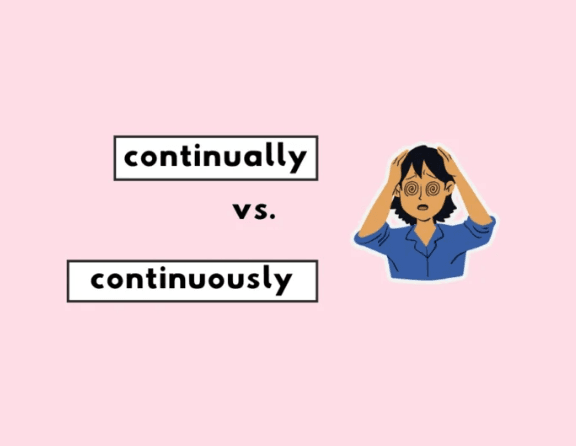Continually vs Continuously: Understanding the Differences and Meaning

Mastering the English language can be challenging. This is especially true in the case of words that seem almost the same, like 'continually' vs 'continuously'. But don't worry! Getting the hang of these words is achievable. Knowing how to use them will help improve your communication skills.
Why is this important, you might ask? Well, even though these two words look alike, they have differences that can change what a sentence means. Using them correctly helps you express yourself clearly and confidently.
In this blog post, we'll discuss the meanings of continually vs continuously in detail. We'll also give you some real-life usage examples. By the end, you'll be able to use these adverbs like a pro! So let's start!
Understanding ‘Continually’ and ‘Continuously’
Let’s begin with the definitions and meanings of continually vs continuously.
Both continually and continuously are adverbs. This means that they describe how an action happens. According to the Oxford Learner's Dictionary, 'continually' means something happens repeatedly. This happens often to the point of being annoying and without any breaks. For example, "The neighbours have been arguing continually since morning." This means they've been arguing without stopping, and it's probably annoying to others.
'Continuously' means something keeps happening or existing without any interruptions. It also refers to an event repeated many times. Consider this example: "The waterfall flows continuously throughout the year." In this case, 'continuously' suggests that the waterfall never stops flowing.
The words are indeed similar and can sometimes be used interchangeably. Keep following along as we explore more examples.
When to use 'Continually' Vs 'Continuously': Examples and Practical Tips
Understanding the difference between 'continually' and 'continuously' can help improve your English skills. These two words are similar, but they're mostly used in different situations. Let's break it down with some examples and practical tips.
Words | Usage | Examples |
Continually | Repeatedly, often annoyingly | She continually interrupted the meeting. The baby cried continually. He continually checked his phone for messages. |
Continuously | Without interruption | The machine hummed continuously. The river flows continuously. The rain fell continuously throughout the day. |
Here are some tips to remember when to use these words:
Continually: If something happens again and again, and it is bothering you or others, use "continually."
Continuously: If something happens without any break, like a river flowing or a machine working, choose "continuously."
Remember, mastering these distinctions will help you communicate more clearly.
Dialogues for Practical Understanding: Continually Vs Continuously in Conversation
Real-life conversations help in understanding the difference between 'continually' and 'continuously' better. Let's consider two dialogue snippets:
Scenario 1:
Anu: "My phone keeps disconnecting continually during calls."
Meena: "Have you tried restarting it?"
In this snippet, 'continually' suggests that the disconnections happen frequently and cause annoyance.
Scenario 2:
Ann: "This machinery operates continuously throughout the day."
Maya: "Must be hard on the power bills."
Here, 'continuously' means the machinery is operating non-stop, without any breaks.
Remember these examples during conversations. They will help you master the usage of continually vs continuously in no time!
How to Practice Using ‘Continually’ and ‘Continuously’?

To master the usage of 'continually' and 'continuously', practice is key. Begin by using these adverbs in your daily conversations and written communication. Try using these words in places where you might use 'often', 'regularly', or 'constantly'. This will help you understand their usage better. For instance, you could say, "She talks continually during movies, which bothers everyone." or "The fan runs continuously in summer." Reading novels or watching English movies can also help you see these words in context.
Reading is a great way to get better at language. It lets you see lots of different ways sentences are put together and learn new words. Novels are particularly helpful for this. They give you lots of examples of how words like 'continually' and 'continuously' are used. For a list of novels that can help you improve your English, check out Clapingo's blog post: Novels to Elevate Your English Proficiency.
For more practice, you can also explore various software options. Check out this blog post to learn more: Software Recommendations for Speaking, Reading and Writing.
To help you improve your day-to-day communication, here is a useful YouTube video:
Final Thoughts
We have seen that it is important to understand the meanings and usages of words like 'continually' and 'continuously'. They may look and sound alike. But, their usage varies depending on the context. Grasping this difference can improve how clearly you express yourself.
To enhance your English fluency further, you can use platforms like Clapingo. Clapingo offers personalised sessions conducted in your native language. Flexible schedules and an easy-to-use platform are other helpful features. Continue this rewarding journey with Clapingo. It will help you unlock countless opportunities in your personal and professional lives.
FAQs
1. How do you use continually in a sentence?
You could use continually as an adverb in a sentence. It indicates actions happening repeatedly such that they may cause annoyance. For example, "He continually argues with me."
2. Is 'constantly' and 'continuously' the same?
No. 'Constantly' also implies ongoing action like 'continuously.' But constantly has connotations of frequency rather than uninterrupted continuity.
3. What can I say instead of continuously?
Synonyms like uninterruptedly, incessantly, ceaselessly or non-stop can be used instead of continuously. The choice depends on the context.
Comments
Your comment has been submitted